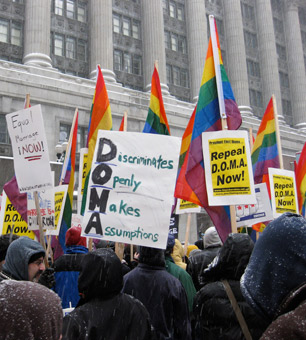The legal battle over marriage rights may soon reach its climax. The US Supreme Court is expected to decide tomorrow if it will entertain a legal showdown over gay marriage.
The high court has been asked to hear several cases involving challenges to the Defense of Marriage Act, or DOMA, which bars the federal government from recognizing same sex marriages performed in states or foreign countries where marriage is a legal right for everyone. A challenge to California’s Proposition 8 ban on gay marriages is also on the table.
After a series of delays, the court indicated last week that it would take its pick of one or more of these cases on December 7. Four of the nine justices must agree to take a case in order for it to be heard.
If the court decides to hear one or more of the cases, an announcement will be made Friday afternoon, according to Christopher Stoll, an attorney for the National Center for Lesbian rights. The court will announce on Monday which cases it rejected, Stoll said.
At least six federal courts have declared DOMA unconstitutional, including two courts of appeals, Stoll said. The Justice Department and the White House also have said DOMA is unconstitutional, and both plaintiffs and defendants in the DOMA cases are urging the high court to finally resolve the issue.
After a high-profile legal battle resulting from a lawsuit filed on behalf of two California couples, the US Court of Appeals for the Ninth Circuit ruled in February that California’s 2008 same-sex marriage ban violates the equal protection clause of the Constitution and struck the ban down.
If the Supreme Court decides not to hear the Proposition 8 appeal, the Ninth Circuit ruling will stand and gay marriage will effectively be legal in California and would be permitted in the near future, Stoll said.
The court may decide to accept one or more of the DOMA cases and keep the Proposition 8 case on hold, however, leaving California couples waiting months or longer for a resolution.
Stoll said that more LGBT rights cases are currently on the Supreme Court’s radar than at any other time in history.
A gay marriage showdown in the Supreme Court would be especially timely, activists say, because public support for marriage rights has risen steadily in recent years and remains at an all-time high.
Since 2006, public support for gay marriage has risen among most major demographics, including conservatives, liberals, seniors and African-Americans, according to a poll analysis by Goodwin Simon Strategic Research.
A Washington Post/ABC poll released in November shows that 51 percent of Americans favor legalizing gay marriage, while 47 percent oppose marriage rights for gay couples. In 2005, a similar poll indicated only 38 percent supported gay marriage rights and 58 percent were opposed.
African-Americans are often singled out as one demographic where support for gay marriage is low due to opposition among church leaders, but a recent Edison Research exit poll found that 51 percent of African-Americans favor marriage rights and only 41 percent were opposed.
Rev. Roland Stringfellow, an openly gay African-American from California who wants to legally marry his husband, said that President Obama’s recent show of support for gay marriage is making a difference among religious leaders.
“President Obama stated that he did not want to be on the wrong side of history, and many African-American clergy members have followed suit,” Stringfellow said.
Alliances between gay rights groups and civil rights groups also have helped rally support, Stringfellow said.
Angry, shocked, overwhelmed? Take action: Support independent media.
We’ve borne witness to a chaotic first few months in Trump’s presidency.
Over the last months, each executive order has delivered shock and bewilderment — a core part of a strategy to make the right-wing turn feel inevitable and overwhelming. But, as organizer Sandra Avalos implored us to remember in Truthout last November, “Together, we are more powerful than Trump.”
Indeed, the Trump administration is pushing through executive orders, but — as we’ve reported at Truthout — many are in legal limbo and face court challenges from unions and civil rights groups. Efforts to quash anti-racist teaching and DEI programs are stalled by education faculty, staff, and students refusing to comply. And communities across the country are coming together to raise the alarm on ICE raids, inform neighbors of their civil rights, and protect each other in moving shows of solidarity.
It will be a long fight ahead. And as nonprofit movement media, Truthout plans to be there documenting and uplifting resistance.
As we undertake this life-sustaining work, we appeal for your support. We have 10 days left in our fundraiser: Please, if you find value in what we do, join our community of sustainers by making a monthly or one-time gift.
